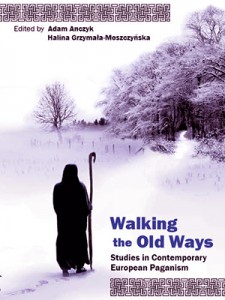Walking the Old Ways. Studies in Contemporary European Paganism
Edited by Adam Anczyk and Halina Grzymala-Moszczyńska
Sacrum, 2012, 230 p. ISBN 978-83-933048-2-0
‘Walking the Old Ways’ is a metaphor. The introduction takes the reader on a very short tour – putting ones feet into the footsteps of generations of travelers that walked this Way hundreds of years ago. But the Old Ways are still walked upon, by people reconstructing the religions of pre-Christian Europe or sharing Neo-Pagan versions. The emphasis in this book is on contemporary Paganism in Central Europe. But one chapter is dedicated to the views of ‘Stenny’, the core members of the Dutch Pagan Folk band Omnia. Yentle Schattevoet analysed the lyrics and the booklets that accompany the albums by Omnia, the Omnia website, the fanzine and newsletters, and answers by ‘Stenny’ to questions on the forum.
The book joins the almost 30 year old tradition of academic studies on contemporary Paganism. It includes articles on those movements that were rarely a subject of an academic interest previously, namely Polish, Greek, Hungarian and Lithuanian Neo-Paganisms. They are accompanied by three case studies, one conducted among the Czech Neo-Pagans, the second being an exploration of religiosity of Omnia members Steve and Jenny, and the third one a recapitulation of a field-study on spiritual-development workshops in Poland. The last article is on religion in Role Playing and Live Action Role-Play games. That may form a platform of comparison – especially in psychological terms – between rituals enacted during the game play and these performed by Neo-Pagans.
Rasa Pranskevičiūtė describes ‘Modeling the Sacred in Nature among Nature-Based Spirituality Movements’. Adam Anczyk explores ‘The Image of Druids in Contemporary Paganism: Reconstructing the Myth’. Do follow the link and download the table of contents to see the other articles (papers).
This book is a must-read for Pagans in Western Europe, not just academic students of New Religious Movements or other fields of religious studies. I’m pleased to see so many interesting views on Neo-Paganism from elsewhere in Europe!

